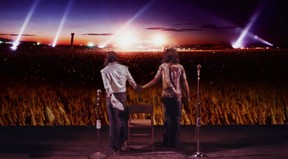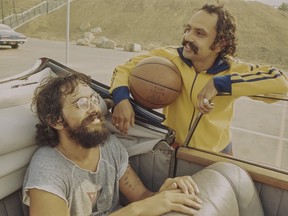Together again: Cheech & Chong's Last Movie chronicles early years, rise to fame, breakup

Reviews and recommendations are unbiased and products are independently selected. Postmedia may earn an affiliate commission from purchases made through links on this page.
Throughout much of the documentary Cheech & Chong’s Last Movie, the iconic comedy duo are shown driving through the desert.
It’s a nice post-modern touch. The setup recalls scenes from Cheech Marin and Tommy Chong’s 1982 comedy Things Are Tough All Over. That film also had the duo travelling through the desert, albeit under decidedly more precarious circumstances.
But it also allows viewers to be a fly on the wall, or windshield, as Marin and Chong joke, reminisce, consume edibles and work through what has been some lingering resentment between the two after finding massive success during the 1970s and ’80s. They squabble like an old married couple, stubbornly bickering over long-ago tensions that eventually led to a less-than-amicable split in the mid- to late-1980s.
Why Cheech & Chong’s relationship was always fractious
They don’t hold back in segments where they are interviewed separately, either. At one point, Marin says his comedic partner has “an ego out of proportion to his actual talent.”
Chong apparently has heard this, since both have watched the film. It seems this has always been the nature of their relationship.
The film goes a long way in explaining this relationship. Eight years older than his partner, Chong would take on a leadership role, eventually directing most of the Cheech & Chong’s movies, which didn’t always sit well with Marin. The in-car segments are obviously staged but they don’t seem scripted or even improvised around a set topic. The arguing seems to come from a real place.
“It was probably a little bit of both,” says Marin, in a Zoom interview with Postmedia alongside Chong. “Because there are these issues that we all have prepared answers for. Yeah, we always went back and forth our whole career. That was part of our method.”
“We live in a physical world, which means a very electronic world,” Chong adds. “To create electricity you need positive against negative and that’s the world we live in. That was between us, too. It wasn’t all positive and it wasn’t all negative, it was a little bit of both … Everybody thinks we were best friends. But we were like brothers. You can hate your brother if he was a dick to you and then you can love him and have his back. That’s all you got.”
Why the comedy duo decided now a good time to make a career-retrospective documentary
Cheech & Chong’s Last Movie, which will screen at the Calgary Underground Film Festival on April 20 and open across Canada on April 25, is framed around the two on a somewhat existential road trip where they search for a place called The Joint and someone named Dave. This might seem a reference to Cheech & Chong’s most famous bit — “Dave’s not here, man” — but it’s more likely a reference to filmmaker David Bushell, who directed the documentary and co-produced it alongside Chong’s daughter Robbi. During the drive, the two pick up a few passengers. That includes Chong’s second and current wife Shelby Chong and Lou Adler, who produced the duo’s early albums and directed their first film, 1978’s Up in Smoke before having a falling out with the pair. Adler offers one of the film’s most telling lines, “If they were always getting along, one of them wouldn’t be necessary,” he says in the backseat as the two bicker up front.
As with many modern documentaries, gaps are filled in with some entertaining animated sequences. But for fans, part of the joy of Cheech & Chong’s Last Movie will be the never-before-seen footage and photos that explore the duo’s early days and rise to fame to become the world’s foremost counter-culture comedy act. Half a century later, it’s easy to forget just how massively successful the duo was as a touring act, recording artists and eventual movie stars. Their albums scaled the charts, their movies were blockbusters, and they opened for the Rolling Stones in front of 20,000 people.
“We had all this great footage laying around not doing anything,” Chong says. “So my daughter, Robbi, and her guy Dave said ‘OK, why don’t we put it together and take nine years and make a movie.”
“… and it was one of the conditions of our parole, too,” Cheech adds.
When asked if there were any photos or footage that surprised them or they hadn’t seen before, Marin points to some of the earliest black-and-white photos of his partner as a teenager in Calgary.
“The early photos of Tommy dancing when he was a teenager,” Cheech says. “That’s how he got into the Black neighbourhoods, I guess, the Black society: because he could dance. I mean, if you could call it dancing in those days.”
Both faced racism during their childhoods in Calgary and East L.A.
The documentary looks at both men’s upbringing. Marin was born and raised in East L.A. as part of a Mexican-American family, initially in a neighbourhood made up primarily of African-American families. His father was a police officer and ruled the roost with an iron fist, giving Marin early cause to rebel.
Chong’s mother was Scottish-Canadian and his father was Chinese. He grew up poor in Calgary, where he was eventually drawn into the city’s Black culture and music.
Both faced a good deal of racism in their respective countries.

One of the more heartbreaking scenes — told through animation — depicts young Tommy watching his friends at a birthday party bonfire through his bedroom window in Calgary. The family who threw the party wouldn’t allow Tommy to attend because he was half-Chinese. Chong says that was just one of many incidents he faced.
“We live in a very racist society,” Chong says. “That’s what the Civil War was all about: Race. I’m 86 years old so I’ve been through it …”
“He remembers the Civil War, distinctly,” Marin intervenes.
“I remember when America dropped the bomb on Japan,” Chong says. “I was going to Grade 1. I remember seeing the headlines on a roadside newspaper stand. In my mind, that’s how far back I go and dealing with racism, from the time I was born until right now. ”

How Tommy Chong entered the counterculture and Black community in Calgary
Chong would eventually marry his first wife in Calgary, Maxine Sneed, who would be an entry point for him into the city’s Black culture. One scene shows the couple’s invitation to their 1960 wedding, which was held at First Church of the Nazarene with a reception at the Ukrainian Labour Temple. Chong, who played in several Calgary bands, eventually moved to Vancouver where he turned his attention to comedy. He formed a strange comedy troupe called The City Works, a hippie-burlesque troupe that featured topless strippers, improv comedians and a vaudeville performer. Marin came to Canada to avoid the draft and — after spending some time in Bragg Creek — headed to Vancouver where he joined City Works as a writer. The group eventually folded, and Cheech & Chong were born. The success wasn’t overnight, of course. But one of the most interesting aspects of the film is that it shows the sheer ambition of the duo. While their humour may suggest hazy thinking, the duo quickly became an efficient and lucrative enterprise. The friction arose, at least partially, because of Chong’s insistence on directing all the films after Up In Smoke. Marin also wanted to broaden his range as an actor. In 1987, he released his first solo film, Born in East L.A., and the two parted ways.
Cheech and Chong took a hands-off approach to documentary
Chong says he is “very impressed with the film.”
“One of the reasons is that there was not a smidgen of Cheech & Chong interference,” he says. “It’s all Dave and the editors.”
“I didn’t know how to feel about it while we were doing it,” says Marin. ” ‘We’re going to drive across the desert again!’ When you see it, it really ties the film together.”
“He was really grumpy,” adds Chong. “And he lives in the desert! When you get old, people interrupt you sitting there doing nothing. They think you’re sitting there doing nothing but you’re not, you’re sitting there trying to stay alive.”
Cheech & Chong’s Last Movie will screen on April 20 at 4:20 p.m. at the Globe Cinema as part of the Calgary Underground Film Festival. It opens in theatres on April 25.





Postmedia is committed to maintaining a lively but civil forum for discussion. Please keep comments relevant and respectful. Comments may take up to an hour to appear on the site. You will receive an email if there is a reply to your comment, an update to a thread you follow or if a user you follow comments. Visit our Community Guidelines for more information.